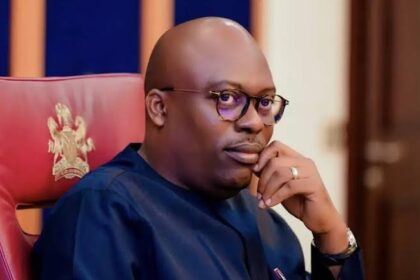….why Tinubu stopped financing the party
The ruling party, the All Progressives Congress (APC)may be broke. The party may be truly bankrupt. If that is the case, then the APC may be flailing right at the edge of the deadly precipice, where prodigal clans careen and plunge down the steep plains of lavishness and sick delight. The facts are mean and the statistics loom grotesquely like tragic integers of an economy in the chokehold of penury and devastation.
According to ThisDay, “As an aftermath of the ongoing probe of the Federal Government’s arms purchase budget, the All Progressives Congress (APC) has hit a brick wall in its attempt to get funding assistance from the Presidency.
The leadership of the ruling party had held a closed-door meeting with President Muhammadu Buhari last Monday to brief him on the state of affairs of the party.
Part of the discussion during the meeting centred on the critical state of the party finances and how the President and other elected members can assist in funding the operations of the party.
However, THISDAY gathered that the party did not succeed in persuading the President to play pivotal role in its fund-raising campaign as he declined to make any commitment, but rather advised the party’s leadership to go back and look inwards on how to mobilise funds internally through regular fees/donations from members.
Those who were at the meeting of the NWC with President Buhari included the National Chairman, Chief John Oyegun; National Secretary, Alhaji Mai-Mala Buni; Deputy National Chairman (North), Senator Lawan Shuaibu, and Deputy National Chairman, Chief Segun Oni.
A highly reliable source at the Presidency told THISDAY that Buhari politely declined any commitment to bear the financial burden of running the party.
“Buhari declined from making any financial commitment. He rather reminded the APC NWC members of how the leaders of the Peoples Democratic Party (PDP) messed themselves up by dipping their hands into public funds to run the party campaigns. He said he would not want APC to be seen as behaving in the same manner, moreso now that it is running a corrective government,” the source said. Since its victory at the 2015 presidential polls in which it secured majority support based on its change mantra, the APC have been very careful to avoid the some of the pitfalls of the PDP.
Even at the risk of operating a very tight budget, the ruling party’s leadership has tried to avoid going to ask its members in government to allocate funds for its activities. The party had relied on voluntary donations from benevolent members until the internal struggles for power and relevance at the National Assembly smeared its relationship with some of these leaders.
For instance, it was learnt that one of the strong financiers of APC and former governor of Lagos state, Asiwaju Bola Ahmed Tinubu has decided to go underground following his displeasure at the actions of the Oyegun-led NWC. Also the APC governors who along with their colleagues in the Governors Forum had gone to seek for federal government’s bail-out fund to pay workers’ salaries found it inexplicable to divert such borrowed funds to party coffers.
It was learnt that at the heat of the financial crunch, one of the governors from the Southern part of the country came to the aid of the party by donating a sum of N50 million last October.
Following the consultative meeting at the presidency, Oyegun summoned an enlarged meeting of members of the NWC on Thursday at the party’s headquarters in Abuja where they were briefed on the outcome of discussions with President Buhari.
The NWC resolved that as part of a fund-raising strategy the party should implement provisions of its constitution which allowed for fees to be charged on members holding elective and appointive positions. Similarly, an initiative was proposed for all card-carrying members of the ruling party to henceforth pay levies in support of the day-to-day operations of the party. As part of the strategy, the party said it would henceforth become binding on all members to fulfill their financial obligations to the party as condition for eligibility to contest elective positions or to seek endorsement of the party for any appointive positions in government.


